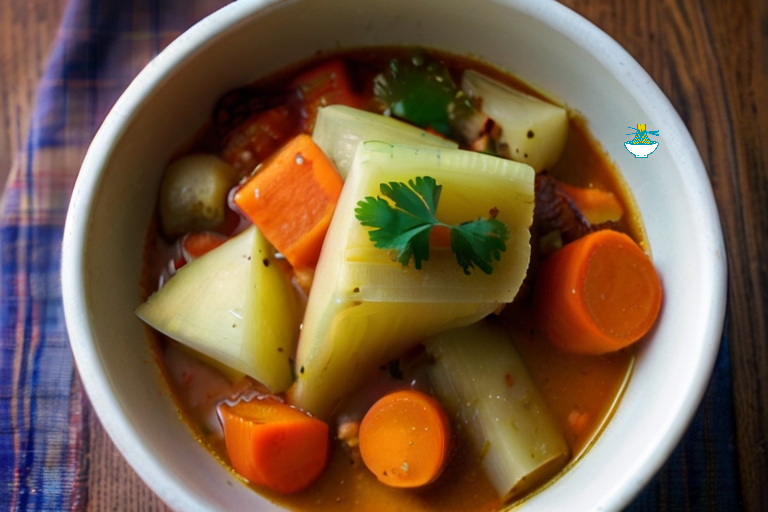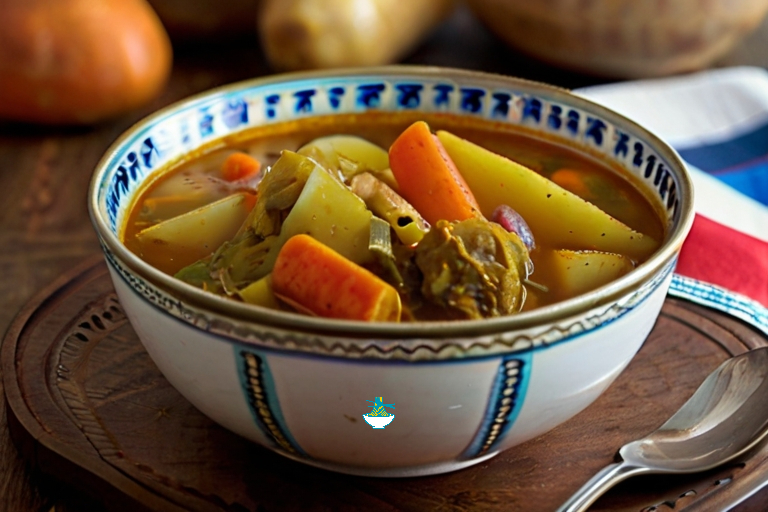Embark on a tantalizing culinary journey with Atkilt Wat, a traditional Ethiopian dish that promises a symphony of flavors and aromas. Atkilt Wat, meaning "vegetable stew" in Amharic, is a beloved Ethiopian delicacy renowned for its rich blend of spices and vibrant vegetables. This hearty stew typically features a medley of carrots, potatoes, cabbage, and green beans, simmered to perfection in a fragrant sauce infused with garlic, ginger, and a signature spice blend known as berbere.
 Discover the essence of Ethiopian cuisine as you delve into the complexities of Atkilt Wat. Each spoonful offers a harmonious balance of textures and tastes, from the tender vegetables to the robust, spicy undertones that linger on the palate. Whether enjoyed on its own or paired with injera, a traditional Ethiopian flatbread, Atkilt Wat embodies the warmth and hospitality of Ethiopian culture.
Discover the essence of Ethiopian cuisine as you delve into the complexities of Atkilt Wat. Each spoonful offers a harmonious balance of textures and tastes, from the tender vegetables to the robust, spicy undertones that linger on the palate. Whether enjoyed on its own or paired with injera, a traditional Ethiopian flatbread, Atkilt Wat embodies the warmth and hospitality of Ethiopian culture.
Experience the cultural significance and culinary mastery of Atkilt Wat as you recreate this iconic dish in your own kitchen or seek it out in authentic Ethiopian restaurants around the globe. Let its rich history and vibrant flavors transport you to the bustling markets and lively streets of Ethiopia, where food is not just sustenance but a celebration of community and tradition.
Ingredients:
- 2 tablespoons vegetable oil
- 1 large onion, finely chopped
- 2 cloves garlic, minced
- 1 tablespoon ginger, grated
- 2 teaspoons berbere spice blend (adjust to taste for spice level)
- 2 large carrots, peeled and sliced into rounds
- 2 medium potatoes, peeled and diced
- 1/2 small cabbage, chopped
- 1 cup green beans, trimmed and cut into bite-sized pieces
- 2 tomatoes, chopped
- 2 cups vegetable broth or water
- Salt to taste
- Chopped fresh cilantro or parsley for garnish (optional)

Instructions:
1- Heat the vegetable oil in a large pot over medium heat. Add the chopped onion and cook until soft and translucent, about 5 minutes.
2- Stir in the minced garlic and grated ginger, and cook for another 2 minutes until fragrant.
3- Add the berbere spice blend to the pot and stir to coat the onions, garlic, and ginger. Cook for an additional minute to toast the spices.
4- Add the sliced carrots and diced potatoes to the pot, stirring to combine with the spices and aromatics. Cook for 5 minutes, allowing the vegetables to start softening.
5- Add the chopped cabbage and green beans to the pot, stirring well to incorporate all the ingredients.
6- Pour in the chopped tomatoes and vegetable broth (or water) to the pot. Bring the mixture to a simmer.
7- Reduce the heat to low, cover the pot, and let the stew simmer gently for 20-25 minutes, or until the vegetables are tender.
8- Once the vegetables are cooked to your liking, season the Atkilt Wat with salt to taste.
9- Serve the spicy vegetable stew hot, garnished with chopped fresh cilantro or parsley if desired. Atkilt Wat is traditionally enjoyed with injera or rice, but you can serve it with any bread or grain of your choice.
10- Enjoy the flavorful and comforting taste of this Ethiopian delicacy!
Feel free to adjust the spice level and vegetable quantities according to your personal preferences. Enjoy your culinary adventure with Atkilt Wat!
Nutritional Values:
Here's an approximate breakdown of the nutritional values for the main ingredients used in the Atkilt Wat recipe:
Vegetable Oil (2 tablespoons):
- Calories: 240
- Fat: 28g
- Carbohydrates: 0g
- Protein: 0g
benefits:Provides essential fatty acids, helps in the absorption of fat-soluble vitamins, and contributes to heart health when consumed in moderation.
Onion (1 large, chopped):
- Calories: 60
- Fat: 0.1g
- Carbohydrates: 14g
- Protein: 2g
benefits:Rich in antioxidants, particularly quercetin, which may reduce inflammation and promote heart health. Onions also contain prebiotic fibers that support gut health.
Garlic (2 cloves):
- Calories: 10
- Fat: 0g
- Carbohydrates: 2g
- Protein: 0.5g
benefits:Known for its antibacterial and antiviral properties, garlic may help boost the immune system, reduce blood pressure, and improve cholesterol levels.
Ginger (1 tablespoon, grated):
- Calories: 18
- Fat: 0.2g
- Carbohydrates: 4g
- Protein: 0.4g
benefits:Contains gingerol, a bioactive compound with anti-inflammatory and antioxidant effects. Ginger may help alleviate nausea, reduce muscle pain, and support digestion.
Berbere Spice Blend (2 teaspoons):
- Nutritional information may vary depending on the specific blend used. Typically, it contains negligible calories, fat, and protein, but it contributes to flavor and may contain some vitamins and minerals.
benefits:While nutritional values can vary, berbere spice blend typically contains spices like chili peppers, fenugreek, and coriander, which may have antioxidant and anti-inflammatory properties.
Carrots (2 large, sliced):
- Calories: 50
- Fat: 0.3g
- Carbohydrates: 12g
- Protein: 1g
benefits:High in beta-carotene, which is converted into vitamin A in the body and essential for vision health. Carrots also provide fiber, potassium, and antioxidants.
Potatoes (2 medium, diced):
- Calories: 220
- Fat: 0.2g
- Carbohydrates: 50g
- Protein: 6g
benefits:Rich in carbohydrates for energy, potatoes also offer vitamin C, potassium, and B vitamins. They are filling and can support digestive health due to their fiber content.
Cabbage (1/2 small head, chopped):
- Calories: 70
- Fat: 0.4g
- Carbohydrates: 16g
- Protein: 3g
benefits:Low in calories and high in fiber, cabbage is a good source of vitamin K, vitamin C, and antioxidants. It may help support digestion and promote heart health.
Green Beans (1 cup, trimmed and cut):
- Calories: 31
- Fat: 0.2g
- Carbohydrates: 7g
- Protein: 2g
benefits:Provide vitamins A, C, and K, as well as folate and fiber. Green beans are low in calories and rich in antioxidants, promoting overall health and aiding digestion.
Tomatoes (2 medium, chopped):
- Calories: 44
- Fat: 0.4g
- Carbohydrates: 10g
- Protein: 2g
benefits:Excellent source of vitamin C, potassium, and lycopene, an antioxidant linked to reduced risk of certain cancers and heart disease. Tomatoes also support skin health and immune function.
Vegetable Broth (2 cups):
- Nutritional values can vary significantly depending on the brand and preparation method. Typically low in calories and fat, and may contain small amounts of carbohydrates and protein.
benefits:Depending on ingredients, vegetable broth may provide vitamins, minerals, and antioxidants. It's low in calories and can be a flavorful base for soups and stews without added fat.
These values are approximate and may vary based on factors such as ingredient size, variety, and cooking methods. Additionally, the dish's overall nutritional content may be affected by factors such as portion size and additional ingredients used in preparation.


Comments